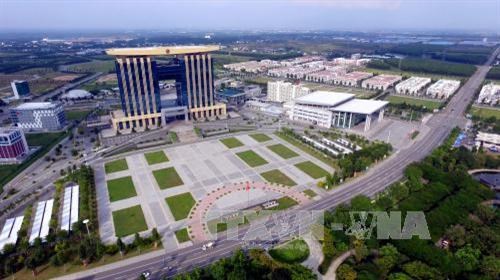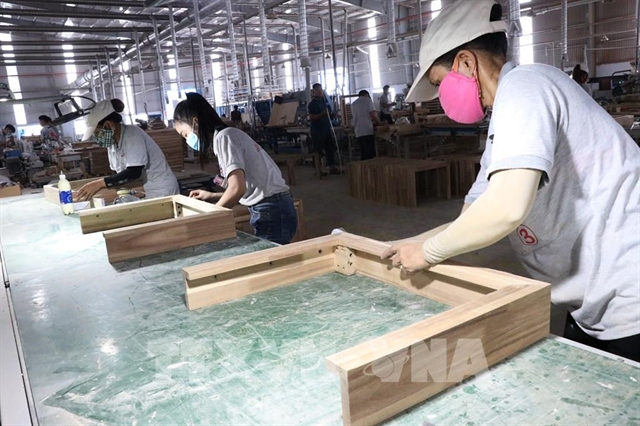 Economy
Economy


|
| Bình Dương New City is a smart city in the southern industrial hub of Bình Dương Province. — VNA/VNS Photo |
BÌNH DƯƠNG — The southern industrial province of Bình Dương eyes an economic growth rate of 8 per cent this year, according to its People’s Committee.
Last year, COVID-19 took a heavy toll on the economy, lowering growth rate to just 2.79 per cent.
But things are back on track post-pandemic, and growth rate has risen to 8.27 per cent year-on-year in the third quarter, with the year-to-date figure being 7.36 per cent.
With this momentum, growth rate for the full year is likely to exceed 8 per cent.
Revenues so far this year are an estimated VNĐ48.5 trillion (US$2.03 billion), or 81 per cent of the full-year target.
One of the fastest growing provinces in the southern key economic zone and among Việt Nam’s hottest investment destinations, Bình Dương has attracted $2.6 billion worth of FDI this year, 45 per cent more than the full-year goal and up 74 per cent year-on-year.
Its exports have risen by 11.9 per cent year-on-year to over $27 billion and imports have been worth more than $19 billion, marginally down.
Its index of industrial production (IIP) grew at an estimated 8.7 per cent as it reeled in over VNĐ200.92 trillion ($8.45 billion) from retail and service activities, a 19.9 per cent rise from last year.
The province targets IIP growth for the full year of 8.9 per cent.

|
| Bình Dương recorded close to US$8 billion worth of trade surplus for the year by end of the third quarter this year. — VNA/VNS Photo |
Võ Văn Minh, chairman of the province People’s Committee, lauded the concerted efforts made by local authorities and the business community to implement socio-economic growth tasks and COVID-19 combat measures.
He called on official agencies to follow plans, closely monitor the market and prices, and ensure balance between supply and demand for essential goods in the remaining months of the year.
Bình Dương plans to prioritise development of supporting industries and manufacturing with the use of advanced and environment-friendly technologies to enable more businesses to enter global value chains.
It also wants to speed up development of infrastructure at industrial parks and clusters, build clusters for supporting industries to meet investors’ demand and enhance the effectiveness of logistics services.
In 2021, the province posted a trade surplus of $6.8 billion.
Bình Dương is a popular destination for foreign investors.
As of September 15 this year, it had attracted $39.6 billion in 4,069 foreign projects to rank second in the country only after HCM City.
Bình Dương New City is a 45-minute drive from HCM City’s Tân Sơn Nhất international airport.
Many CEOs and investors from Southeast Asia, Japan, South Korea, India and elsewhere have been invited to Bình Dương to look at the huge FDI opportunities there.
Bình Dương New City will be the centre of the smart province and house the most important urban areas, research and educational institutions and industrial zones.
It is home to a growing number of technology and fabrication labs in schools, universities and vocational colleges that collaborate closely with industrial partners and the provincial Department of Science and Technology.
Techlabs offer practical education in the latest technology, including equipment provided by industry partners and space for joint research by universities and employers.
Bình Dương’s techlabs include a lighting lab at the Eastern International University, a mechanical electrical lab at the Việt Nam-Singapore Vocational College and an ICT lab at Thủ Dầu Một University for research into robotics and intelligent systems, power electronics system, and data analysis and artificial intelligence.
Local agencies have been told to prioritise projects related to semiconductors, LED lighting projects and e-governance. They will seek partnerships with neighbouring cities and provinces, businesses, and local and international experts, to help with the projects.
Bình Dương was the only area in Việt Nam named as one of the world’s Smart21 communities in 2018 by the US’s Intelligent Community Forum, a non-profit policy research organisation focused on job creation and economic development in the broadband economy. VNS